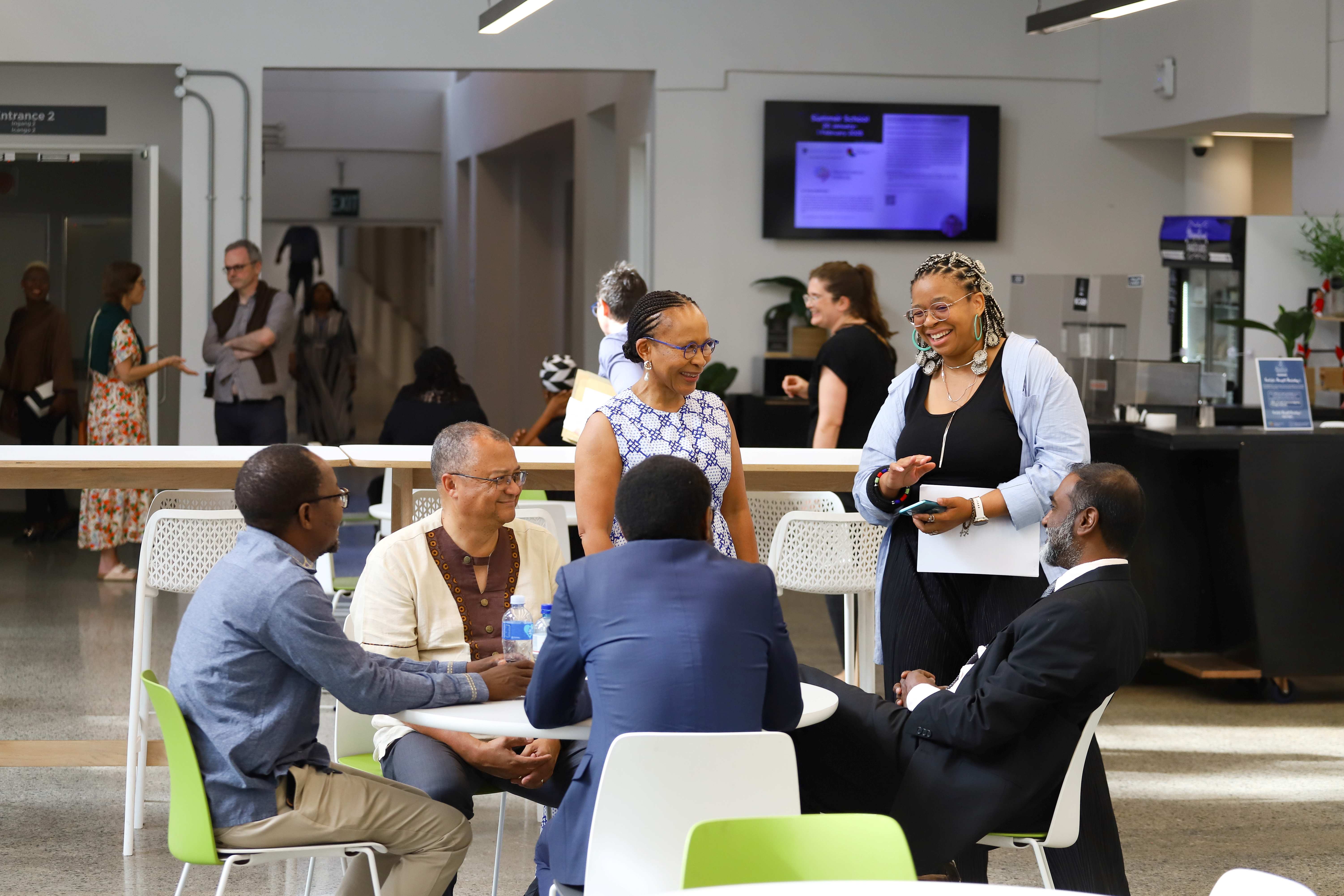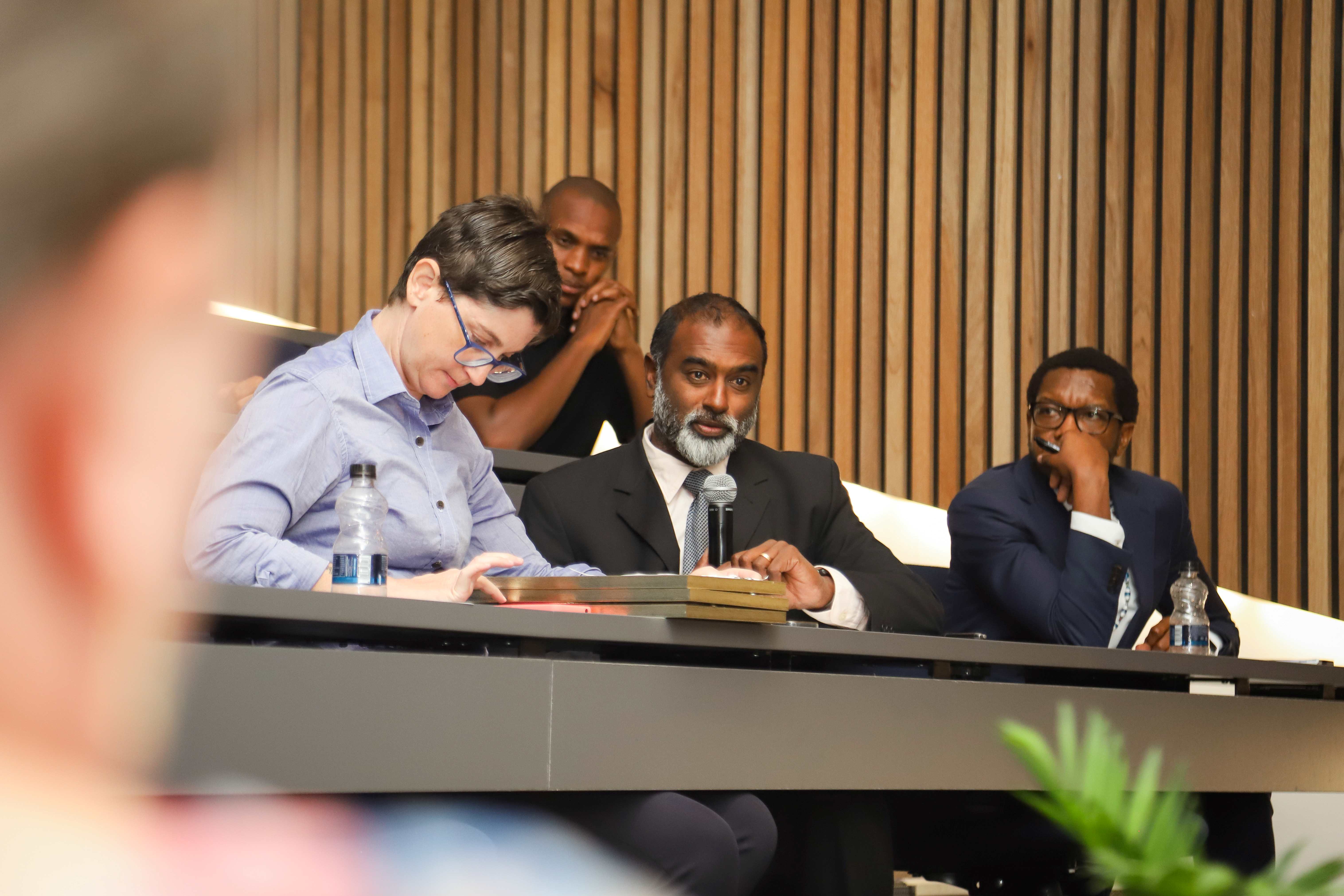Innovation, global impact and resilience of UCT’s research community celebrated
18 December 2024 | Story Ayanda Mthethwa. Photos Je'nine May. Read time 9 min.
A typical day for an academic often involves having many irons in the fire – teaching, research, sitting on committees and heaps of administration – with each day bringing its own unique set of challenges and demands. It was this tightrope walk which took centre stage at the University of Cape Town’s (UCT) annual Research Celebration, held on 4 December 2024, where mid-career researchers engaged about their academic journeys, which exemplify the innovation and resilience that define UCT researchers.
A celebration of UCT’s research achievements, this annual event is hosted under the auspices of Professor Jeff Murugan, Acting Deputy Vice-Chancellor: Research and Internationalisation and Dr Linda Mtwisha, Executive Director: Research.
This theme, ‘Elevating ideas and empowering futures,’ brought together a selection of university community members, media representatives and private sector partners at the UCT Neuroscience Institute building to reflect on and celebrate the accomplishments of UCT’s research community.
Acknowledging that the past 12 months could be described as ranging from anxiety-ridden to awe-inspiring, in her welcome address Dr Mtwisha said: “This is a good time to take stock of and recognise what we’ve managed to achieve.”
Professor Murugan reflected on the year’s research landscape. He mentioned that UCT continues to excel in all five major world rankings, holding the 1st position in several key areas. Highlights include:
- 15th in the world for Development Studies.
- An increased number of subjects ranked in the top 50 from two in 2023 to five in 2024.
This year, UCT made its debut in the top 100, landing at 77th globally in the Times Higher Education (THE) Impact Rankings, with particularly strong performances in:
- Partnerships for the Goals (SDG 17), ranked 7th globally.
- In its first-ever submission UCT ranked 13th globally for Life Below Water (SDG 14).
- Four other areas were ranked within the top 100.
Murugan also celebrated the outstanding achievements of UCT researchers, recognising them for winning several internationally competitive awards and grants across various disciplines, including:
- Dr Sarah Fawcett who was selected to join the Ocean Biogeochemistry Virtual Institute (OBVI).
- Professor Anthony Figaji, the recipient of the Wellcome Discovery Award.
- Dr Melissa Nel and Associate Professor Esmita Charani were awarded the Wellcome Career Development Award.
- Drs Alisha Chetty and Rachael Dangarembizi who earned the MRC/UKRI African Leaders Fellowship.
- Dr James Keaveney, recipient of the inaugural New Frontiers Research Award from the Oppenheimer Memorial Trust.
- At this year’s National Research Foundation (NRF) awards, UCT’s research strength was highlighted as UCT researchers won awards across a range of fields.
- Through the UCT–University of Bristol (UoB) Professorship and Fellowship Programme, in March, two UCT researchers set off to Bristol to begin their fellowships, marking an exciting milestone. UCT also welcomed a few fellows from UoB during the year. This followed the launch of a second round of applications, which now includes mid-career researchers, further broadening the programme’s reach.
“I thought the life of an academic is focused on just research but the more you gain seniority the less research you do.”
Concluding his reflections on the year’s highlights, Murugan emphasised the importance of leading research that is deeply embedded in the communities it aims to impact. “This combination of leadership and community-focused research defines the careers of many UCT researchers who have reached the pinnacle of their fields,” he said.
Navigating the complex academic journey
The panel discussion of select mid-career researchers from across UCT’s faculties was facilitated by Professor Ralph Hamann, Deputy Director: Faculty and Research from the Graduate School of Business (GSB).
The academic journey is filled with challenges, uncertainties and sometimes unexpected detours. While academics are often driven by passion for knowledge and discovery, the pressure to meet institutional, societal and familial demands can take a toll.
“I thought the life of an academic is focused on just research but the more you gain seniority the less research you do. Research becomes an ‘extra gig’ you do on the side. Work now bleeds into the personal,” said Dr Itumeleng Monageng, an astrophysicist in the Department of Astronomy and the South African Astronomical Observatory (SAAO).
Dr Mubeen Goolam, a P-rated stem cell researcher in the Faculty of Health Sciences’ Department of Human Biology shared his survival toolkit for navigating academic life: learning to say no, even to seniors. “Not everything is urgent, even if it feels that way in the moment. Give yourself space to breathe,” he advised. Dr Goolam is also the founder of the BrainStem Initiative at UCT’s Neuroscience Institute.
On handling burnout, Deputy Dean: Undergraduate Studies at the Faculty of Law, Associate Professor Jameelah Omar emphasised the importance of being realistic. “Don’t set unrealistic expectations, it’ll be difficult to deal with the frustration and disappointment when you’ve not met those. Rather be relatively conservative in your planning.”
Reflecting on her early days at UCT, Associate Professor in Art History, Nomusa Makhubu said she was fortunate to have received researcher development support from the Research Office. “The programmes of the Research Office gave us a lot of resources we needed which are not just financial, but they gave us a community to belong,” she said.
The Research Office plays a crucial role in developing the next generation of academics and researchers. Programmes like the Emerging Researcher Programme (ERP), have made significant strides in transforming the demographic profile of UCT’s academic staff to be more inclusive and diverse.
“What’s particularly impressive is that those articles have garnered nearly 20 million reads globally.”
Another common theme that emerged among the panellists was the pivotal role the right mentors play in supporting and guiding mid-career researchers. Mentors serve as a type of “north-star”, providing direction and equipping researchers with tools to navigate challenges and access opportunities that’ll help broaden their networks. In doing so, they help mid-career researchers maximise their impact.
“I’ve been fortunate to have some amazing mentors and because of [them], I’ve been fortunate to take the skills they’ve taught me and pass them down to my colleagues [who come after me],” said Professor Kirsten Corin, the head of Flotation Chemistry in the Centre for Minerals Research at the Department of Chemical Engineering.
UCT in conversation
The Conversation Africa’s (TCA) commissioning editor for Science and Technology, Natasha Joseph and the vice-chancellor, Professor Mosa Moshabela presented two awards. The first recognised author of the most-read article, Professor Linda-Gail Bekker for her article ‘HIV breakthrough: drug trial shows injection twice a year is 100% effective against infection.’ The second honoured joint winners, Professor Bekker and Professor Alan Hirsch for having the most published articles in TCA between 1 November 2023 and 31 October 2024.
Joseph commended UCT researchers for carving out time for science communication: “547 researchers from UCT have written 1 056 articles for us. What’s particularly impressive is that those articles have garnered nearly 20 million reads globally, translated into various languages and reached places where otherwise research coming out of this university and continent wouldn’t necessarily be seen.”
Alan Pifer 2023 Award
This prestigious recognition is presented annually by the vice-chancellor to honour exceptional research that advances societal welfare. This year, Professor Keertan Dheda, a global leader in Tuberculosis (TB) research and the director of the Centre for Lung Infection and Immunity (CLII) and the CLII Clinical Trials Unit at the UCT Lung Institute, received the award.
Over two decades, Professor Dheda has dedicated his scientific innovation and academic pursuits to achieving meaningful societal impact, particularly by reducing the TB burden in vulnerable communities across South Africa and the continent.
Launching research communication and marketing products
During the celebrations and reflections, new research communication and marketing products were unveiled, including the latest addition to the Research Snapshots, the ‘Postgraduates for Africa and Beyond’. This new addition to the suite showcases UCT’s vibrant postgraduate environment, featuring tailored support, cutting-edge facilities and dynamic research networks.
In his closing remarks, Professor Moshabela reminded the audience that behind every success, there are many individuals who contribute to the university’s running through their hard work and dedication. “To make this machine wheel that we call UCT to turn, there are countless people who put their shoulders to the wheel, and it comes at a cost for a lot of them,” he said. While encouraging the community in attendance and by extension to practice kindness as a key tenet in their way of working.
 This work is licensed under a Creative Commons Attribution-NoDerivatives 4.0 International License.
This work is licensed under a Creative Commons Attribution-NoDerivatives 4.0 International License.
Please view the republishing articles page for more information.



















